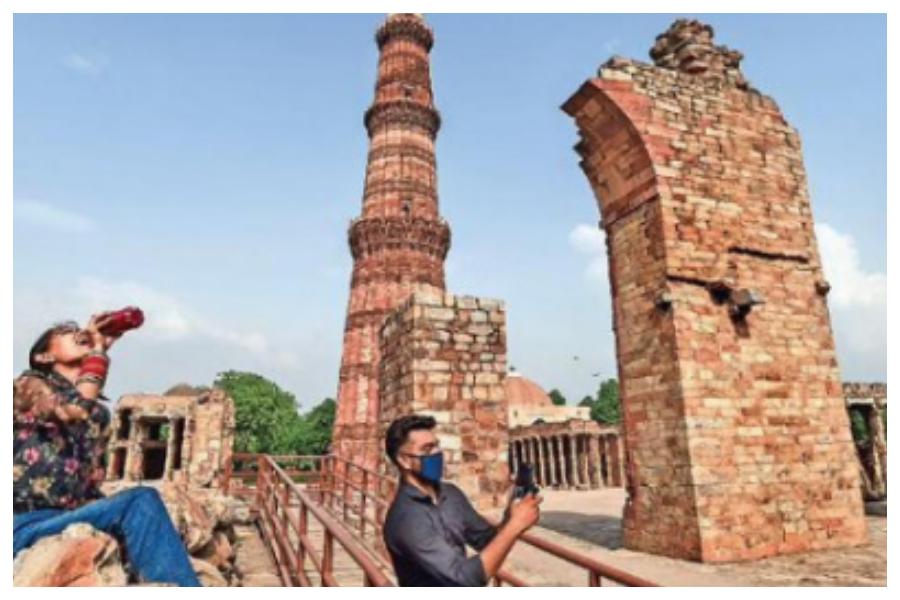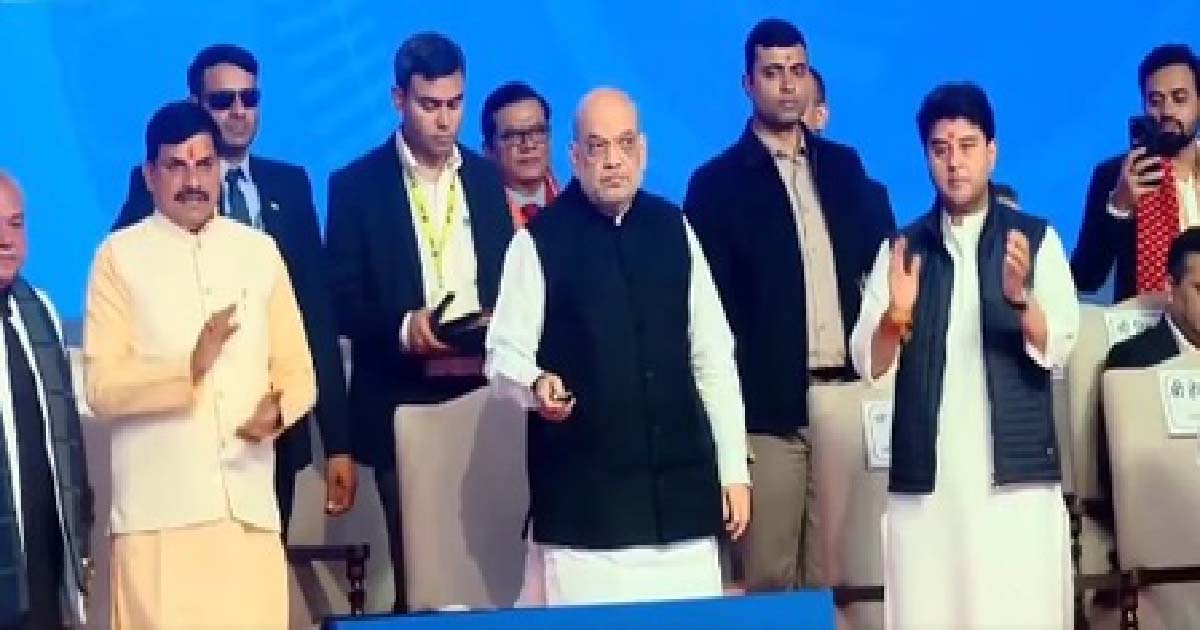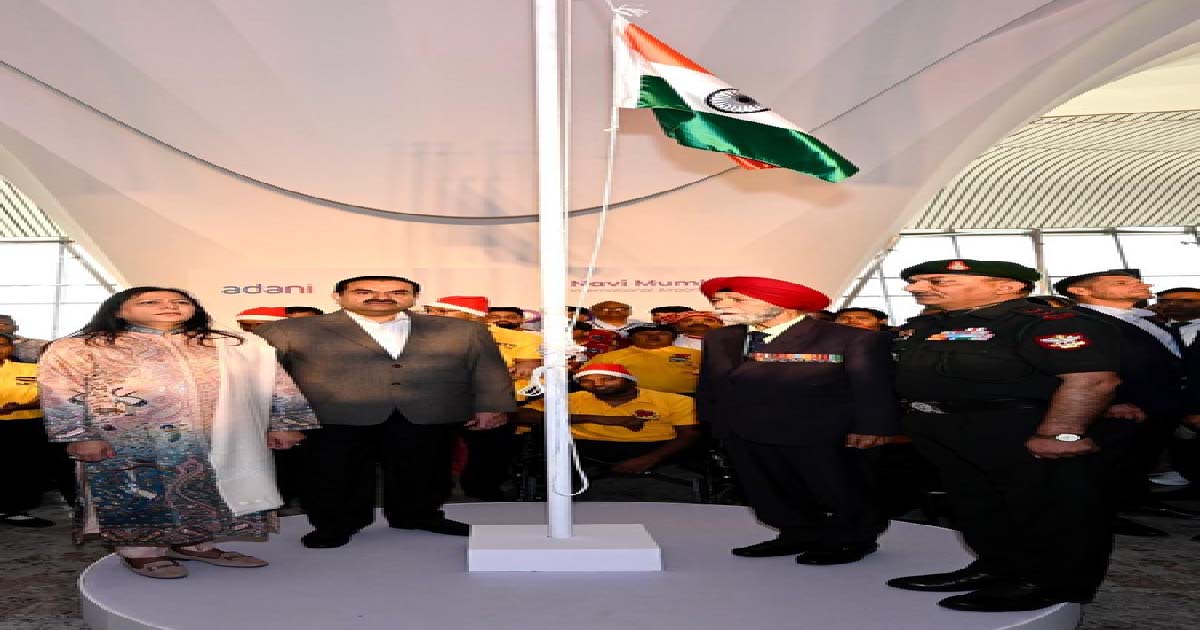National News
Hindu sculptures exist, but worship against the law: ASI on Qutub Complex

Opposing a plea seeking restoration of Hindu and Jain temples and deities at the Qutub Minar complex, the Archaeological Survey of India (ASI) on Tuesday stated that though there was existence of Hindu sculptures inside the premises, worshipping inside the centrally-protected monument would be contrary to existing laws.
Fundamental rights cannot be availed in violation of any status of the land, the archaeological body clarified in an affidavit.
“The basic principle of protection/conservation is not to allow starting of any new practice in a monument declared and notified as a protected one under the Act. Revival of worship is not allowed wherever it is not practiced at the time of protection of a monument,” it said.
“It will be contrary to the provisions of the AMASR Act, 1958 (Ancient Monuments and Archaeological Sites and Remains Act) to agree to the contention of the respondents or any other person claiming a fundamental right to worship in this centrally protected monument,” it said in the affidavit.
The submissions of the ASI came during the hearing the appeal challenging the rejection of a suit alleging that the Quwwat-Ul-Islam Masjid situated within the Qutub Minar complex in Mehrauli was built in place of a temple complex.
Earlier on February 22, allowing the appeal, Additional District Judge Pooja Talwar had sought the response of the Union of India through the Ministry of Culture, Director General of the Archaeological Survey of India, and Superintending Archaeologist, Delhi Circle, ASI in the matter.
“The Qutub Minar is not a place of worship and since the time of its protection from the Central government, the Qutub Minar or any part of the Qutub Minar was under worship by any community,” the ASI said in its affidavit.
During the course of the hearing, ASI’s counsel submitted that the apprehensions of the appellant were misplaced as the agency was not contemplating any removal or shifting of the idols as of now. Shifting of the idols would involve various permissions from different agencies, and have national implications as it would amount to a policy decision, counsel clarified.
The appellant alleged that around 27 Hindu and Jain temples were desecrated and damaged in 1198 under the rule of Slave Dynasty ruler Qutub-Din-Aibak raising the construction of the said mosque in place of those temples.
The ASI, in the submission said that there is no denial of the fact about the deities presence. It stated that the architectural materials and images of Hindu and Jain deities were reused in the construction of the Qutub Minar Complex.
“This is very clear from the inscription in the complex which is open for public viewing,” it said.
Crime
ED raids Ruchi Group’s Indore, Mumbai premises; freezes assets, seizes cash in bank fraud case

Indore/Mumbai, Dec 25: The Directorate of Enforcement (ED), Indore Zonal Office, has conducted extensive search operations under the Prevention of Money Laundering Act (PMLA), 2002, at multiple locations in Indore and Mumbai, the investigation agency said on Thursday.
The raids on December 23 targeted premises linked to the Ruchi Group in connection with ongoing investigations into alleged bank fraud cases.
The probe stems from multiple FIRs registered by the Central Bureau of Investigation (CBI), Bhopal, against several Ruchi Group entities. These include M/s Ruchi Global Ltd. (now renamed M/s Agrotrade Enterprises Ltd.), M/s Ruchi Acroni Industries Ltd. (now M/s Steeltech Resources Ltd.), and M/s RSAL Steel Pvt. Ltd. (now M/s LGB Steel Pvt. Ltd.), it said.
The companies, promoted by the late Kailash Chandra Shahra and Umesh Shahra, are accused of orchestrating large-scale bank frauds through fund diversion, siphoning, and accounting manipulations, resulting in substantial wrongful losses to public sector banks.
The ED officials revealed that the investigation uncovered a sophisticated conspiracy involving the creation of numerous shell entities, the agency said.
These were used for round-tripping transactions, where spurious Letters of Credit and Cash Credit facilities were manipulated to divert funds for private gain.
Bogus sales and purchases were recorded, and deliberate losses inflicted to siphon off loan amounts obtained ostensibly for legitimate business purposes, it said.
Proceeds of crime generated from these frauds were allegedly concealed and layered to disguise their illicit origins.
During the searches, authorities froze bank balances exceeding Rs 20 lakh belonging to the accused persons and their family members. Additionally, cash amounting to over Rs 23 lakh was seized, along with significant incriminating documents and digital devices that establish the roles of the accused in the fraud, said the agency.
This action revives scrutiny on the Ruchi Group, which has faced prior allegations of financial irregularities.
Earlier CBI probes, dating back to 2021, had flagged similar issues in group companies, including a Rs 188 crore fraud case involving a bank consortium.
The current ED operation signals intensified efforts to trace and recover laundered assets, it said.
Further investigation is progressing, with sources indicating potential attachments of properties and deeper probes into the beneficiaries of the diverted funds.
Business
HM Shah lays foundation stone for 1,655 industrial units ensuring Rs 2 lakh crore investment in MP

Gwalior, Dec 25: Union Home and Cooperation Minister Amit Shah delivered an inspiring address at the ‘Abhyudaya Madhya Pradesh Growth Summit’ here on Thursday, marking the 101st birth anniversary of former Prime Minister and Bharat Ratna recipient Atal Bihari Vajpayee.
Speaking on the theme ‘Investment to Employment – Atal’s Resolve, a Bright Madhya Pradesh’, HM Shah hailed the state’s rapid transformation under the double-engine government, declaring that Madhya Pradesh is emerging as the growth engine of ‘Viksit Bharat’.
HM Shah lavished praise on Chief Minister Mohan Yadav for pioneering initiatives aimed at balanced regional development across the state.
He highlighted CM Yadav’s innovative approach of organising regional investment promotion events and ground-breaking ceremonies in every division, ensuring equitable growth and unlocking the untapped potential of all areas.
“Chief Minister Mohan Yadav has taken thoughtful steps to establish a strong foundation for all-round development through his regional investment committees,” he said, adding that these efforts surpass even the energetic pace set by previous long-serving BJP Chief Minister Shivraj Singh Chouhan.
The Home Minister emphasised the critical importance of symmetrical industrial establishment to leverage Madhya Pradesh’s strategic geographical location.
He pointed to the traditional strength of cotton production in the Malwa and Gwalior-Chambal regions, noting that declining farmer incomes due to unfair prices could be reversed by setting up processing and allied industries locally. This would minimise transportation costs, make cotton farming profitable again, and connect seamlessly to markets in Delhi, western states, and nearby districts.
HM Shah described the day’s massive investment push – with foundation stones laid for 1,655 industrial units worth over Rs 2 lakh crore, expected to create 193,000 jobs – as a fitting tribute to former Prime Minister Vajpayee’s vision of good governance and national progress.
Held in Vajpayee’s birthplace, the summit, he said, embodied the late leader’s ideology of self-reliance, development, and inclusive growth, giving it a grand resonance on this auspicious occasion.
HM Shah expressed hope for continued central support, promising that true welfare stems from aligning with Prime Minister Narendra Modi’s vision for a prosperous India. The event, attended by prominent industrialists and cabinet ministers, reinforced Madhya Pradesh’s commitment to converting investments into widespread employment and regional prosperity.
Business
Gautam Adani hails war heroes, workers, farmers, and specially-abled as NMIA commences operations

Mumbai, Dec 25: Gautam Adani, Chairman of the Adani Group, hailed war heroes, farmers, and the specially abled as the Navi Mumbai International Airport (NMIA) — India’s newest Greenfield airport — welcomed its first passengers on Thursday.
The airport, inaugurated by Prime Minister Narendra Modi on October 8, began its operations on the day of Christmas.
Welcoming the first passengers, the Adani Group Chairman saluted the soldiers who protect the nation, workers who built the airport for their “unbreakable spirit”, farmers who feed the country, and the specially abled who inspire the nation.
“It was a deeply moving moment to stand beside Param Vir Chakra awardees Captain Bana Singh and Subedar Major Sanjay Kumar as the Navi Mumbai International Airport (NMIA) welcomed its very first passengers,” said Gautam Adani, in a post on social media platform X.
“In that moment, alongside the war heroes, stood the other quiet architects of the nation — the workers who built this airport with their bare hands and unbreakable spirit; the farmers and their families who feed India; the social workers who selflessly serve millions alongside the @AdaniFoundation; and our specially abled colleagues who inspire us every single day. For many of them, this was the first flight of their lives,” the Adani Group Chairman added.
“Soldiers who protect Bharat. Workers who build Bharat. Farmers who sustain Bharat. Social workers who serve Bharat. The specially abled who inspire Bharat,” the industrialist said.
Gautam Adani stated that NMIA showcases an opportunity for the country to move forward without leaving anyone behind.
“@AdaniPriti and I were deeply honoured to stand with them at NMIA – a moment that captured what this airport truly represents – opportunity with dignity, and a rising India that moves forward without leaving anyone behind,” the Adani Group Chairman said.
“Their blessings, their courage, and their resilience drive us every single day to build bigger, serve better, and work harder in service of the nation. Jai Hind,” the businessman added.
NMIA is a public-private partnership (PPP) between Mumbai International Airport Limited (MIAL), a subsidiary of Adani Airports Holdings Limited (AAHL), which holds the majority stake of 74 per cent, while the City and Industrial Development Corporation of Maharashtra Limited (CIDCO) hold the remaining 26 per cent.
In the first month, NMIA will operate for 12 hours — between 08:00 hours and 20:00 hours — handling 23 scheduled daily departures.
During the initial launch period, passengers will benefit from services operated by IndiGo, Air India Express, and Akasa Air, connecting Mumbai to 16 major domestic destinations.
Starting February 2026, the airport will transition to round-the-clock operations, expanding to 34 daily departures to meet the increasing needs of the MMR.
NMIA is also conducting comprehensive Operational Readiness and Airport Transfer (ORAT) trials in collaboration with all stakeholders, including security agencies and airline partners.
-

 Crime3 years ago
Crime3 years agoClass 10 student jumps to death in Jaipur
-

 Maharashtra1 year ago
Maharashtra1 year agoMumbai Local Train Update: Central Railway’s New Timetable Comes Into Effect; Check Full List Of Revised Timings & Stations
-

 Maharashtra1 year ago
Maharashtra1 year agoMumbai To Go Toll-Free Tonight! Maharashtra Govt Announces Complete Toll Waiver For Light Motor Vehicles At All 5 Entry Points Of City
-

 Maharashtra1 year ago
Maharashtra1 year agoFalse photo of Imtiaz Jaleel’s rally, exposing the fooling conspiracy
-

 National News1 year ago
National News1 year agoMinistry of Railways rolls out Special Drive 4.0 with focus on digitisation, cleanliness, inclusiveness and grievance redressal
-

 Maharashtra1 year ago
Maharashtra1 year agoMaharashtra Elections 2024: Mumbai Metro & BEST Services Extended Till Midnight On Voting Day
-

 National News1 year ago
National News1 year agoJ&K: 4 Jawans Killed, 28 Injured After Bus Carrying BSF Personnel For Poll Duty Falls Into Gorge In Budgam; Terrifying Visuals Surface
-

 Crime1 year ago
Crime1 year agoBaba Siddique Murder: Mumbai Police Unable To Get Lawrence Bishnoi Custody Due To Home Ministry Order, Says Report












